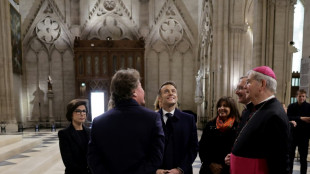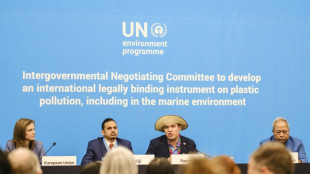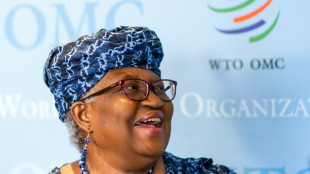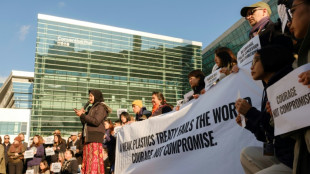
-
 Norris boosts McLaren title hopes with sprint pole
Norris boosts McLaren title hopes with sprint pole
-
Big-hitting Stubbs takes satisfaction from grinding out Test century

-
 Romania recounts presidential ballots as parliamentary vote looms
Romania recounts presidential ballots as parliamentary vote looms
-
French skipper Dalin leads as Vendee Globe passes Cape of Good Hope

-
 Chelsea not in Premier League title race, says Maresca
Chelsea not in Premier League title race, says Maresca
-
Brazil's Bolsonaro aims to ride Trump wave back to office: WSJ

-
 France requests transfer of death row convict held in Indonesia: minister
France requests transfer of death row convict held in Indonesia: minister
-
'Mamie Charge': Migrants find safe haven in Frenchwoman's garage

-
 Iconic Uruguayan ex-leader hails country's swing left as 'farewell gift'
Iconic Uruguayan ex-leader hails country's swing left as 'farewell gift'
-
Thousands rally in Georgia after violent police crackdown on pro-EU protesters

-
 Shared experiences make Murray 'perfect coach', says Djokovic
Shared experiences make Murray 'perfect coach', says Djokovic
-
Iran, Europeans to keep talking as tensions ratchet up

-
 Inflation-wary US consumers flock to 'Black Friday' deals
Inflation-wary US consumers flock to 'Black Friday' deals
-
France shows off restored Notre Dame after 'impossible' restoration

-
 South African bowlers strike after Sri Lanka set big target
South African bowlers strike after Sri Lanka set big target
-
Namibia reopens polls after election chaos in ruling party test

-
 Georgia police arrest dozens in clashes with pro-EU protesters
Georgia police arrest dozens in clashes with pro-EU protesters
-
US stocks rise on Black Friday

-
 Leclerc on top for Ferrari in Qatar GP practice
Leclerc on top for Ferrari in Qatar GP practice
-
Jihadists, allies enter Syria's second city in lightning assault

-
 Amorim puts faith in Mount to turn around Man Utd career
Amorim puts faith in Mount to turn around Man Utd career
-
Guardiola will not 'run' from Man City rebuild

-
 Assisted dying campaigners, opponents rally at UK parliament
Assisted dying campaigners, opponents rally at UK parliament
-
Durable prop Healy set to carve name in Irish rugby history

-
 Macron unveils Notre Dame after 'impossible' restoration
Macron unveils Notre Dame after 'impossible' restoration
-
Traumatised Spain marks one month since catastrophic floods

-
 Yen rallies, euro up on rising inflation data
Yen rallies, euro up on rising inflation data
-
Attack-minded Spurs boss Postecoglou says: 'You'll miss me when I'm gone'

-
 Syria jihadists, allies shell major city Aleppo in shock offensive
Syria jihadists, allies shell major city Aleppo in shock offensive
-
Macron inspects 'sublime' Notre Dame after reconstruction

-
 Arsenal must be near-perfect to catch Liverpool, says Arteta
Arsenal must be near-perfect to catch Liverpool, says Arteta
-
Arrests, intimidation stoke fear in Pakistan's politics

-
 Showdown looms on plastic treaty days before deadline
Showdown looms on plastic treaty days before deadline
-
Ngozi Okonjo-Iweala: the WTO's trailblazing motivator

-
 WTO chief reappointed as Trump threat looms
WTO chief reappointed as Trump threat looms
-
US landmine offer to Ukraine throws treaty into 'crisis': campaign group

-
 British MPs debate contentious assisted dying law
British MPs debate contentious assisted dying law
-
Macron offers first glimpse of post-fire Notre Dame

-
 Syria jihadists, allies shell Aleppo in shock offensive
Syria jihadists, allies shell Aleppo in shock offensive
-
Japan government approves $92 bn extra budget

-
 Toll in Syria jihadist-army fighting rises to 242: monitor
Toll in Syria jihadist-army fighting rises to 242: monitor
-
UK transport secretary quits in setback for Starmer

-
 Days before deadline, plastic treaty draft highlights disagreement
Days before deadline, plastic treaty draft highlights disagreement
-
Crypto boss eats banana art he bought for $6.2 million

-
 Teen news boss criticises Australian social media ban
Teen news boss criticises Australian social media ban
-
Taiwan detects 41 Chinese military aircraft, ships ahead of Lai US stopover

-
 Spain urged to 'build differently' after deadly floods
Spain urged to 'build differently' after deadly floods
-
WTO chief faces heavy task as Trump threat looms

-
 Herbert takes control at Australian Open as Smith tanks
Herbert takes control at Australian Open as Smith tanks
-
Israel PM again warns Iran after top diplomat talks of revising nuclear doctrine


Cubans voting on a landmark liberalization of family code
Cubans went to the polls Sunday to vote in a landmark referendum on whether to legalize same-sex marriage and adoption, allow surrogate pregnancies and give greater rights to non-biological parents.
President Miguel Diaz-Canel and his wife cast their ballots early at a Havana polling station in what he said is a needed revision of the country's 1975 Family Code.
The new code, he told reporters, "is a fair, necessary, up-to-date, modern norm that gives rights and guarantees to all people, to the full diversity of families, of people and of creeds."
Cubans aged 16 and over are being asked to vote simply "Yes" or "No" to the question: "Do you agree with the Family Code?"
The updated code would represent a major shift in a country where machismo is strong and where the authorities, in the 1960s and 1970s, sent homosexuals to militarized labor camps.
Official attitudes have since evolved, and the government has conducted an intense media campaign in favor of the new code.
But the referendum comes amid the country's worst economic crisis in 30 years and could provide an opportunity for some voters to voice opposition to the government.
The law needs more than 50 percent of the vote to be adopted, and dissidents have called on citizens to reject the code or to abstain from voting.
If approved, the new code would permit surrogate pregnancies, as long as no money changes hands, while boosting the rights of children, the elderly and the disabled.
Significantly, it would define marriage as the union between two people, rather than that of a man and a woman.
"We are not voting 'Yes' with the PCC (Cuban Communist Party)," Maykel Gonzalez, a gay activist, insisted on Twitter. "It is the PCC which is voting 'Yes' with us."
- 'I'm Christian, I have other ideas'-
Several Latin American countries -- Argentina, Brazil, Chile, Colombia, Costa Rica and Ecuador, as well as some Mexican states -- now recognize same-sex marriages.
An effort by Havana in 2019 to join that group failed amid strong criticism from church leaders.
This month, the Cuban Conference of Catholic Bishops announced its stand against several points in the new code, including surrogate pregnancies and adoption by same-sex couples.
But many Cubans say they now support such ideas.
"A few years ago I would not have accepted this code," 78-year-old Elio Gomez, a former teacher of Marxism, told AFP at a Havana polling station. "But one has to keep up. This is a very human code, totally inclusive."
Others disagreed.
"I'm Christian, I have other ideas, I don't accept this," said Zulika Corso, 65, a teacher.
- 'More important subjects' -
The code's sweeping reach, including nearly 500 articles, fed doubts among some who said they agreed, for example, with same-sex marriages but not with surrogate pregnancies.
The code was the subject of months of intense debate across Cuba.
Still, political scientist Rafael Hernandez called it the "most important human rights legislation" there since the 1959 revolution.
Cuba today is experiencing a grave economic crisis -- with shortages of food, fuel and medicine -- aggravated by US sanctions and a tourism collapse due to the coronavirus pandemic.
Experts say voters could use this occasion to express their broad disapproval of the government.
"There are many other subjects that are more important than the Family Code, like the fact there is no food, that many people are hungry," concierge Julio Cesar Vazquez told AFP.
Polling stations close at 6:00 pm local time (2200 GMT).
C.Meier--BTB
